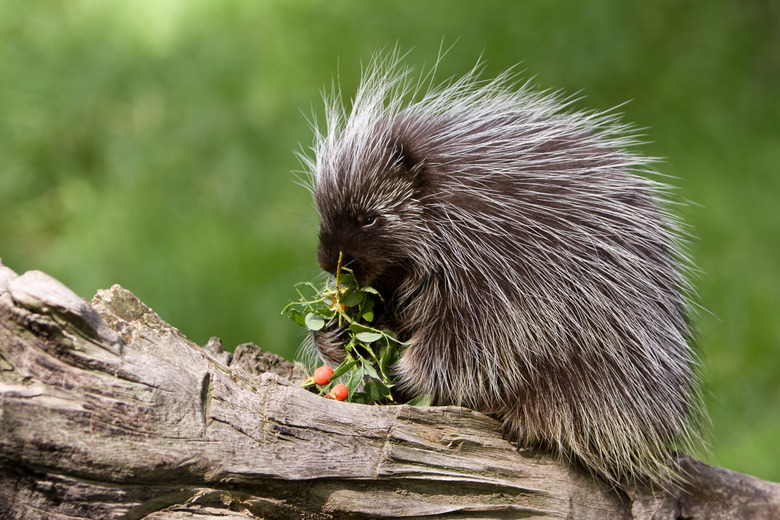The Differences Between A Porcupine And A Hedgehog
The porcupine and hedgehog are prickly mammals. They are often confused because they both have sharp, needle-like quills on their body. However, that's about the only similarity between the two animals. Porcupines and hedgehogs differ in size, defensive behavior, diet and country of habitation. Their quills also have different features.
TL;DR (Too Long; Didn't Read)
Porcupines and hedgehogs differ in size and the structure and function of their quills. They live in different habitats. Porcupines eat plants while hedgehogs are carnivorous.
Geographical Locations
Geographical Locations
The porcupine and hedgehog are found in different areas of the world. Both are native to Africa, Europe and Asia. Hedgehogs have also been introduced to areas of New Zealand. Some species of porcupines are native to the New World, ranging from the Canada and the United States to South America.
Tree and Grassland Habitats
Tree and Grassland Habitats
The porcupine covers a range of habitats, unlike the hedgehog. North and South American species of porcupine spend a lot of their time in trees. They have gripping tails that help them climb. The species of porcupines in Europe, Asia and Africa inhabit deserts, grasslands and forests. On the other hand, the hedgehog prefers building a nest under vegetation around parks, farmlands and gardens. They live close to hedgerows, woodland edges and suburban gardens for a convenient food supply.
Long or Short Quills
Long or Short Quills
The quills on each type of animal have different features. The hedgehog has shorter quills, about 1 inch in length. In contrast, the porcupine's is 2 to 3 inches, while the African species can grow quills over 11 inches long. A hedgehog's quills cannot easily come off its body, while a porcupine's quills can easily detach themselves. The number of quills on the body also differs. On average a hedgehog has 5,000 quills. In comparison, a porcupine has approximately 30,000.
Size Matters
Size Matters
A hedgehog can grow between 4 and 12 inches in length. A porcupine can grow to triple the size, between 20 and 36 inches. Each animal has a tail, which differs in size also. A hedgehog's tail is up to 2 inches in length, while the porcupine's is between 8 and 10 inches. The porcupine uses its long tail to climb trees, while the hedgehog stays on the ground.
Defensive Behavior
Defensive Behavior
The hedgehog and porcupine exhibit different behaviors when they feel threatened. When the hedgehog feels threatened, it curls up into a ball. Its quills act like a defensive barrier to stop predators attacking. On the other hand, the porcupine arches its back so the quills stick up when it feels threatened. It waves its tail around to hit an attacker, and the tail quills will detach and stick into a predator.
Herbivore and Carnivore
Herbivore and Carnivore
Porcupines are herbivores. Depending on the food available in their habitat, they will eat fruit, leaves, grass, buds, bark and stems. Hedgehogs are carnivores and act as useful garden pets. They eat pests like slugs, which damage gardens. Other food for them includes insects, centipedes, worms, mice, snails, frogs and small snakes.
Cite This Article
MLA
Wood, Laura. "The Differences Between A Porcupine And A Hedgehog" sciencing.com, https://www.sciencing.com/differences-between-porcupine-hedgehog-8182400/. 17 May 2018.
APA
Wood, Laura. (2018, May 17). The Differences Between A Porcupine And A Hedgehog. sciencing.com. Retrieved from https://www.sciencing.com/differences-between-porcupine-hedgehog-8182400/
Chicago
Wood, Laura. The Differences Between A Porcupine And A Hedgehog last modified March 24, 2022. https://www.sciencing.com/differences-between-porcupine-hedgehog-8182400/
